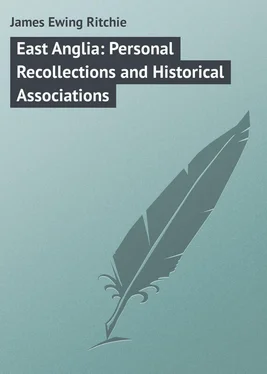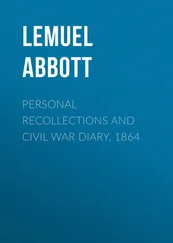James Ritchie - East Anglia - Personal Recollections and Historical Associations
Здесь есть возможность читать онлайн «James Ritchie - East Anglia - Personal Recollections and Historical Associations» — ознакомительный отрывок электронной книги совершенно бесплатно, а после прочтения отрывка купить полную версию. В некоторых случаях можно слушать аудио, скачать через торрент в формате fb2 и присутствует краткое содержание. Жанр: foreign_prose, на английском языке. Описание произведения, (предисловие) а так же отзывы посетителей доступны на портале библиотеки ЛибКат.
- Название:East Anglia: Personal Recollections and Historical Associations
- Автор:
- Жанр:
- Год:неизвестен
- ISBN:нет данных
- Рейтинг книги:5 / 5. Голосов: 1
-
Избранное:Добавить в избранное
- Отзывы:
-
Ваша оценка:
- 100
- 1
- 2
- 3
- 4
- 5
East Anglia: Personal Recollections and Historical Associations: краткое содержание, описание и аннотация
Предлагаем к чтению аннотацию, описание, краткое содержание или предисловие (зависит от того, что написал сам автор книги «East Anglia: Personal Recollections and Historical Associations»). Если вы не нашли необходимую информацию о книге — напишите в комментариях, мы постараемся отыскать её.
East Anglia: Personal Recollections and Historical Associations — читать онлайн ознакомительный отрывок
Ниже представлен текст книги, разбитый по страницам. Система сохранения места последней прочитанной страницы, позволяет с удобством читать онлайн бесплатно книгу «East Anglia: Personal Recollections and Historical Associations», без необходимости каждый раз заново искать на чём Вы остановились. Поставьте закладку, и сможете в любой момент перейти на страницу, на которой закончили чтение.
Интервал:
Закладка:
‘All roofless now the stately pile,
And rent the arches tall,
Through which with bright departing smile
The western sunbeams fall.
‘Tradition’s voice forgets to tell
Whose ashes sleep below,
And Fancy here unchecked may dwell,
And bid the story flow.’
Ah! what was that story? How the question puzzled my young head, as I walked in the sandy lane that led from my native village! How insignificant looked the little church built up inside! What had become of the crowds that at one time must have filled that ancient fane? How was it that no trace of them remained? They had vanished in the historical age, and yet no one could tell how or when. Nature was, then, stronger than man. He was gone, but the stars glittered by night and the sun shone by day, and the ivy had spread its green mantle over all. Yes! what was man, with his pomp and glory, but dust and ashes, after all! How I loved to go to Covehithe and climb its ruins, and dream of the distant past!
Here in that eastern point of England it seemed to me there was a good deal of decay. Sometimes, on a fine summer day, we would take a boat and sail from the pretty little town of Southwold, about four miles from Wrentham, to Dunwich, another relic of the past. According to an old historian, it was a city surrounded with a stone wall having brazen gates; it had fifty-two churches, chapels, and religious houses; it also boasted hospitals, a huge palace, a bishop’s seat, a mayor’s mansion, and a Mint. Beyond it a forest appears to have extended some miles into what is now the sea. One of our local Suffolk poets, James Bird (I saw him but once, when I walked into his house, about twelve miles from Wrentham, having run away from home at the ripe age of ten, and told him I had come to see him, as he was a poet; and I well remember how then, much to my chagrin, he gave me plum-pudding for dinner, and sent me to play with his boys till a cart was found in which the prodigal was compelled to return), wrote and published a poetical romance, called ‘Dunwich; or, a Tale of the Splendid City;’ and Agnes Strickland also made it the subject of her melodious verse, commencing:
‘Oft gazing on thy craggy brow,
We muse on glories o’er.
Fair Dunwich! Thou art lonely now,
Renowned and sought no more.’
Never has a splendid city more utterly collapsed. After a long ride over sandy lanes and fields, you come to the edge of a cliff, on which stand a few houses. There is all that remains of the Dunwich where the first Bishop of East Anglia taught the Christian faith, and where was born John Daye, the printer of the works of Parker, Latimer, and Fox, who, in the reign of Mary, became, as most real men did then, a prisoner and an exile for the truth. He has also the reputation of being the first in England who printed in the Saxon character. In the records of type-founding the name of Daye stands with that of the most illustrious. When the Company of Stationers obtained their charter from Philip and Mary, he was the first person admitted to their livery. In 1580 he was master of the company, to which he bequeathed property at his death. The following is the inscription which marks the place of his burial in Little Bradley, Suffolk:
‘Here lyes the Daye that darkness could not blynd,
When Popish fogges had overcast the sunne;
This Daye the cruel night did leave behind,
To view and show what bloudie actes were donne.
He set a Fox to write how martyrs runne
By death to lyfe, Fox ventured paynes and health.
To give them light Daye spent in print his wealth,
But God with gayne returned his wealth agayne,
And gave to him as he gave to the poore.
Two wyfes he had partakers of his payne:
Each wyfe twelve babes, and each of them one more,
Als was the last increaser of his store;
Who, mourning long for being left alone,
Sett up this tombe, herself turned to a stone.’
Unlike Covehithe, Dunwich has a history. In the reign of Henry II., a MS. in the British Museum tells us, the Earl of Leicester came to attack it. ‘When he came neare and beheld the strength thereof, it was terror and feare unto him to behold it; and so retired both he and his people.’ Dunwich aided King John in his wars with the barons, and thus gained the first charter. In the time of Edward I. it had sixteen fair ships, twelve barks, four-and-twenty fishing barks, and at that time there were few seaports in England that could say as much. It served the same King in his wars with France with eleven ships of war, well furnished with men and munition. In most of these ships were seventy-two men-at-arms, who served thirteen weeks at their own cost and charge. Dunwich seems to have suffered much by the French wars. Four of the eleven ships already referred to were captured by the French, and in the wars waged by Edward III. Dunwich lost still more shipping, and as many as 500 men. Perhaps it might have flourished till this day had if not been for the curse of war. But the sea also served the town cruelly. That spared nothing – not the King’s Forest, where there were hawking and hunting – not the homes where England nursed her hardy sailors – not even the harbour whence the brave East Anglians sailed away to the wars. In Edward III.’s time, at one fell swoop, the remorseless sea seems to have swallowed up ‘400 houses which payde rente to the towne towards the fee-farms, besydes certain shops and windmills.’ Yet, when I was a lad, this wreck of a place returned two members to Parliament, and Birmingham, Manchester and Sheffield not one. Between Covehithe and Dunwich stood, and still stands, the charming little bathing-place of Southwold. Like them, it has seen better days, and has suffered from the encroachments of the ever-restless and ever-hungry sea. It was at Southwold that I first saw the sea, and I remember naturally asking my father, who showed me the guns on the gun-hill – pointing seaward – whether that was where the enemies came from.
Southwold appears to have initiated an evangelical alliance, which may yet be witnessed if ever a time comes of reasonable toleration on religious matters. In many parts of the Continent the same place of worship is used by different religious bodies. In Brussels I have seen the Episcopalians, the Germans, the French Protestants, all assembling at different times in the same building. There was a time when a similar custom prevailed in Southwold, and that was when Master Sharpen, who had his abode at Sotterley, preached at Southwold once a month. There were Independents in the towns in those days, and ‘his indulgence,’ writes a local historian, ‘favoured the Separatists with the liberty and free use of the church, where they resorted weekly, or oftener, and every fourth Sunday both ministers met and celebrated divine service alternately. He that entered the church first had the precedency of officiating, the other keeping silence until the congregation received the Benediction after sermon.’ Most of the people attended all the while. It was before the year 1680 that these things were done. After that time there came to the church ‘an orthodox man, who suffered many ills, and those not the lightest, for his King and for his faith, and he compelled the Independents not only to leave the church, but the town also. We read they assembled in a malt-house beyond the bridge, where, being disturbed, they chose more private places in the town until liberty of conscience was granted, when they publicly assembled in a fish-house converted to a place of worship.’ At that time many people in the town were Dissenters; but it was not till 1748 that they had a church formed. Up to that time the Southwold Independents were members of the Church at Wrentham, one of the Articles of Association of the new church being to take the Bible as their sole guide, and when in difficulties to resort to the neighbouring pastor for advice and declaration. Such was Independency when it flourished all over East Anglia.
Читать дальшеИнтервал:
Закладка:
Похожие книги на «East Anglia: Personal Recollections and Historical Associations»
Представляем Вашему вниманию похожие книги на «East Anglia: Personal Recollections and Historical Associations» списком для выбора. Мы отобрали схожую по названию и смыслу литературу в надежде предоставить читателям больше вариантов отыскать новые, интересные, ещё непрочитанные произведения.
Обсуждение, отзывы о книге «East Anglia: Personal Recollections and Historical Associations» и просто собственные мнения читателей. Оставьте ваши комментарии, напишите, что Вы думаете о произведении, его смысле или главных героях. Укажите что конкретно понравилось, а что нет, и почему Вы так считаете.












